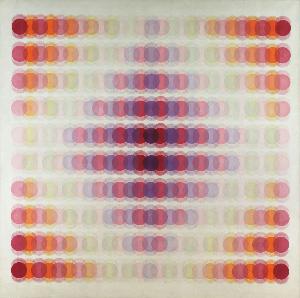Manuel Espinosa Iglesias
Manuel Espinosa Iglesias;Manuel Espinosa
Place: Buenos Aires
Born: 1912
Death: 2006
Biography:
Manuel Espinosa Iglesias was a leading protagonist in the history of Argentine Modernism, born in 1912 in Buenos Aires, Argentina, and passed away in 2006. His paintings and works on paper are characterized by line, color, and optical sensations of movement and light. Manuel Espinosa Iglesias graduated from the Escuela Nacional de Artes and finished his studies at the Escuela Superior de Bellas Artes.
Artistic Career and Style
Manuel Espinosa Iglesiaswas one of the leaders of geometric art in Argentina. He was a founding member of the Asociación de Arte Concreto-Invención, established in Buenos Aires in 1943. This group proposed a rupture as an alternative to the traditional art forms, seeking a new visual language that corresponded to the exigencies of a new technological and industrial society. The group's goals included the abolition of any reference to nature, the use of non-referential forms, and the use of industrial materials.
Notable Works and Collections
Some of Manuel Espinosa Iglesias' notable works include Illetas and Zebedea, both oil on canvas paintings. His work is represented in the collections of the National Gallery of Art, Washington, D.C., the Museum of Fine Arts, Houston, Texas, and the Museo Nacional de Bellas Artes, Neuquén, Argentina. You can explore more of his works on Wikioo.org.
Legacy and Importance
Manuel Espinosa Iglesiasplayed a significant role in shaping the Argentine Modernism movement. His use of geometric shapes and bold colors created a unique visual language that continues to inspire artists today. As an art expert, it is essential to recognize the contributions of pioneers like Manuel Espinosa Iglesias in shaping the modern art landscape.
- Visit Wikioo.org to explore more of Manuel Espinosa Iglesias' works, including Illetas and Zebedea.
- Discover the National Gallery of Art and its collection of Argentine Modernism on Wikioo.org.
- Learn more about the Asociación de Arte Concreto-Invención and its influence on Argentine art on Wikioo.org.


